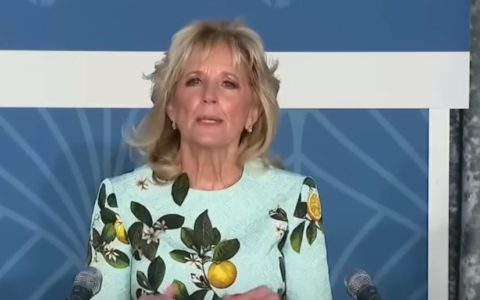
Joe Biden is testing the U.S. Supreme Court’s authority. But now it’s coming back at him.
Because the Supreme Court Justices are preparing to take an axe to Joe Biden’s agenda.
Legal experts predicted that on Wednesday, the Supreme Court would rule in favor of small fishing businesses, overturning a decades-old precedent that requires courts to respect agency interpretations of laws in cases where the language is unclear.
This has allowed presidential administrations, like Joe Biden’s, to be left unchecked with how they regulate small businesses in certain industries.
The conservative justices of the court, including Neil Gorsuch, Brett Kavanaugh, and Samuel Alito, have criticized the government for failing to clarify when the “ambiguity” that necessitates respecting an agency’s interpretation of a statute becomes applicable. Without Chevron deference, liberal justices on the court were worried that judges would start deciding policy.
“The arguments definitely showed that we have a constitutionalist court here,” JCN President Carrie Severino shared with journalists concerning oral arguments of the case. The majority seems to agree that the Chevron theory has serious flaws, the most basic of which is that it goes against the Administrative Procedure Act and the separation of powers. Many people are skeptical of the effects on the courts and the relationship between the two institutions, arguing that it gives the executive branch too much power and makes Congress less likely to pass laws.
On Wednesday, the justices will hear arguments in two cases that seek to reverse the 1984 decision that created Chevron deference, which led to agency readings of legislation regularly being upheld in court: Loper Bright Enterprises v. Raimondo and Relentless, Inc. v. Department of Commerce. In both instances, smaller fishing firms challenged a NOAA regulation that would have them pay up to $700 per day for federally-mandated on-board observers in court. Lower courts affirmed the regulation based on the Chevron decision.
In her statement to the judges, Solicitor General Elizabeth Prelogar said that when the court has “exhausted the tools of interpretation and has not found a single right answer,” ambiguity in legislation occurs.
Gorsuch brought attention to the fact that lower courts have been having trouble interpreting Chevron, pointing out that a “dozen or more” circuit judges had petitioned the Supreme Court to reverse the decision.
According to Gorsuch, those who lack the authority to influence agencies, such as “the immigrant, the veteran seeking his benefits, the social security disability applicant,” are disadvantaged because Chevron provides the government a significant edge against individual litigants.
“I didn’t see a case cited, perhaps I missed one, where Chevron wound up benefiting those kinds of peoples,” he noted.
When asked about the legality of the matter of who should pay for the boat’s monitoring, Justice Ketanji Brown Jackson expressed worry that the court may become a policymaker by majority rule if companies like Chevron were taken away. “I see that as a policy question.”
“The issue we’re deciding here is more like the countless policy issues that are going to confront this country in the years and decades ahead: will courts be able to decide these issues as to things they know nothing about … that just don’t have any expertise … or are people in the agencies going to do that?”
In his argument, Prelogar characterized Chevron as a “bedrock principle” and stated that the “thousands” of judicial judgments based on it would be “shocked” if the decision were to be overturned.
Justice Amy Coney Barret raised the issue of precedent as well, asking if rulings that had been based on Chevron may be called into question in the event that it was overturned.
Justice Gorsuch: How come Chevron never benefits the little guy?
“The cases I saw routinely on the courts of appeals—and I think this is what niggles at so many of the lower court judges—are the immigrant, the veteran seeking his benefits, the social security disability… pic.twitter.com/wkIDtIqZN4
— Carrie Severino (@JCNSeverino) January 17, 2024
In response to the claim that Chevron brings consistency into the law, the corporations’ counsel and a number of judges pointed out that rules are subject to change between administrations.
“Each new administration can come in and undo the work of a prior one — they’re all reasonable, I mean, my goodness, the American people elect them, of course they’re reasonable,” Gorsuch claimed.
According to Kavanaugh, traditionally, the duty of the judiciary has been to “police the line between the legislature and the executive… to make sure the executive is not operating as a king.”
“Today’s oral arguments in the Relentless and Loper Bright cases went to the very heart of a judge’s role: What does it mean to exercise judicial power?” a representative of the Cato Institute shared with reporters in a statement.
“It appears likely that a majority of the Court is now poised to overturn the Chevron doctrine entirely and to make clear that judges must simply apply their own best readings of statutes. As counsel for both Loper Bright and Relentless pointed out, that task can include giving proper respect to longstanding and contemporaneous interpretations of the Executive Branch.”
We’ve seen the U.S. Supreme Court directly rule against the Biden administration a number of times including when they completely shredded the Biden regime’s plan to unconstitutionally cancel student loan debts.
This is just another example of the new conservative Supreme Court bench being willing to question the authority of the executive branch in an age when the White House has largely been left unchecked.
Stay tuned to the DC Daily Journal.





